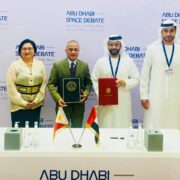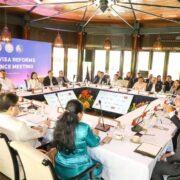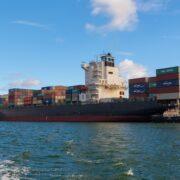
ABU DHABI — The Philippines and UAE formalized their space technology cooperation by signing a Memorandum of Understanding (MOU) on Space Cooperation between the Philippine Space Agency (PhilSA) and UAE Space Agency (UAESA) on 05 December 2022, at the sidelines of the Abu Dhabi Space Debate being hosted by the UAE at the ADNOC headquarters.
PhilSA Director General Dr. Joel Joseph S. Marciano Jr. signed on behalf of the Philippines while UAESA Director General Salem Butti Salem Al Qubaisi signed on behalf of UAE. Philippine Ambassador to the UAE Hjayceelyn M. Quintana, who first proposed the idea of bilateral space cooperation when she met with UAESA officials in Masdar City on 19 August 2021, witnessed the signing ceremony.
“The signing of the MOU is a momentous development in our bilateral relations. This MOU on Space Cooperation proves that the potential for further expansion of the collaboration between the Philippines and the UAE is limitless as both sides continue to discover new and innovative areas where we can work together,” said Ambassador Quintana.
“The MOU on Space Cooperation paves the way for deeper collaboration between the two countries in space technologies that will address food security, natural disaster mitigation, and enhance economic growth, thus ensuring a bright future for the next generation. It is my hope that this will also spur the interest of Filipino and Emirati youth to aspire for careers in science and technology,” she added.
The bilateral partnership with UAE is in line with the directives of President Ferdinand R. Marcos, Jr. who said that the country’s preparedness for natural disasters and push for economic growth should be driven by data and science, which may emanate from the Philippines’ space cooperation with bilateral partners.
Recently, President Marcos has also given his full support for the launch of the Multi-spectral Unit for Land Assessment (MULA) Satellite in 2025. The said satellite is currently being developed by PhilSA and is expected to cover 73,000 square kilometers in 24 hours, gathering data on all land, air and sea territory of the Philippines. It can detect air and water quality, determine abundant fishing grounds, zoom-in on traffic situations in cities and urban centers, improve maritime domain awareness, as well as generate 24-hour monitoring and security evaluation.
—
For more information, visit https://www.abudhabipe.dfa.gov.ph, https://www.facebook.com/PHinUAE/, https://twitter.com/PHinUAE or https://www.instagram.com/phinuae/.





